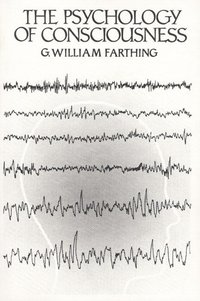
Fler böcker inom
- Format
- Häftad (Paperback)
- Språk
- Engelska
- Antal sidor
- 480
- Utgivningsdatum
- 1991-10-01
- Upplaga
- 1
- Förlag
- Pearson
- Medarbetare
- Farthing
- Illustrationer
- Illustrations
- Dimensioner
- 230 x 154 x 30 mm
- Vikt
- Antal komponenter
- 1
- Komponenter
- PUZZLE
- ISBN
- 9780137286683
- 780 g
Kundrecensioner
Har du läst boken?
Sätt ditt betyg »
Innehållsförteckning
(NOTE: Each chapter concludes with a Summary and Endnotes.)
1. The Concept of Consciousness.
2. Characteristics of Consciousness.
Higher-order characteristics of consciousness. Aspects of conscious experience. The unity of consciousness.
3. Introspection I: Methods and Limitations.
Introspection and introspective verbal reports. Types of introspection. Limitations of introspective verbal reports. Methods of obtaining introspective reports. The process of introspection. Conclusion.
4. The Mind-Body Problem.
Approaches to the mind-body problem. Dualism. Varieties of materialism. Reductionism. The other-minds problem.
5. Brain and Consciousness I: Split-Brain Research.
A brief overview of brain organization. Split-brain research. The question of dual consciousness. Consciousness, language, and brain modularity. Left-brain, right-brain mania.
6. Brain and Consciousness II: Dissociations between Consciousness and Behavior.
Blindsight. Amnesia. Other neuropsychological dissociation syndromes. Explaining dissociation syndromes. Nonconscious processing in normal subjects.
7. Introspection II: Access to the Causes of Behavior.
Nisbett and Wilson's anti- introspectionist theory. Evidence for introspective access. Conclusion.
8. Daydreaming and the Stream of Consciousness.
Dimensions of thought in normal waking states. Research on daydreaming. The functions of daydreaming. Sensory deprivation and consciousness. Toward a theory of the stream of consciousness.
9. Altered States of Consciousness.
The variety of ASCs. The importance of ASCs. The concept of altered states of consciousness. Dimensions of changed subjective experience in ASCs. Producing altered states of consciousness. Identifying specific ASCs. Studying ASCs: Subjective and objective knowledge.
10. Sleep.
Sleep-wake cycles. Stages of sleep. The function of sleep. Sleep deprivation and human performance. The function of REM sleep. Sleep disorders.
11. Dreaming I: Phenomenology and Influences on Contents.
Definition of "dream." Your own dream diary. Phenomenological characteristics of REM dreams. Dreaming in NREM sleep. Laboratory dreams compared with home dreams. Sleep onset: The hypnagogic state. Factors that influence dream contents.
12. Dreaming II: Theories and Research.
Sigmund Freud's psychoanalytic theory of dreaming. Hobson and McCarley's neurophysiological theory of dreaming. David Foulkes's cognitive theory of dreaming. The functions of dreaming.
13. Dreaming III: Dream Recall and Lu...
